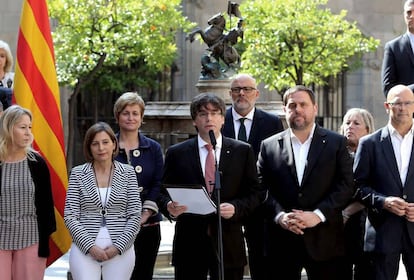Catalan independence referendum to be held on October 1: regional premier
People to be asked: Do you want Catalonia to be an independent state in the form of a republic?

Voters in the northeastern Spanish region of Catalonia have been asked to cast their ballot on October 1 in a referendum that will ask them: Do you want Catalonia to be an independent state in the form of a republic?
Regional premier Carles Puigdemont announced on Friday morning that he is planning to call a independence referendum for Catalonia on that day, despite lacking consent from the Spanish government.
“The problem is real and profound,” said Puigdemont in a statement at the Catalan government’s headquarters in Barcelona in which he outlined the details of the planned referendum.
We have explained it all over the world, but we are reaching the end of the term and we are still without an answer
Catalan premier Carles Puigdemont
We have explained it all over the world, but we are reaching the end of the term and we are still without an answer
Catalan premier Carles Puigdemont
The pro-sovereignty leader said that his administration has attempted to reach a negotiated deal with a hostile central government in Madrid “up until the last day” and “repeatedly.”
“We sent proposals to agree on holding a negotiation,” he said. “We have explained it all over the world, but we are reaching the end of the term and we are still without an answer.”
Meanwhile, Puigdemont’s deputy, Oriol Junqueras – a longtime leader of the small, pro-sovereignty party Catalan Republican Left (ERC) – went further in his criticism of Madrid officials.
“We think it is opportune to provide context for the moment we find ourselves in, facing a State which has denied the citizens of Catalonia [the right to] vote,” he said. “A Spanish government that assaults fundamental democratic rights, and has ministers who conspire against the Catalan health system.”
No guarantees
The announcement does not guarantee that the referendum can be held. In all likelihood it will be annulled by Spain’s Constitutional Court, which has already struck down regional resolutions fleshing out the secessionist road map that was approved by the Catalan assembly on November 9, 2015.
The central government has already stated that “the referendum will not take place” and that all necessary mechanisms will be activated to prevent it.
The Catalan government’s decree officially calling the referendum is expected to be approved in the second half of August.

Despite Friday’s announcement, the Catalan government is not completely closing the door on a negotiated way out. At his recent speech in Madrid, Puigdemont said he was willing to negotiate “up until the last minute of overtime.” And there are voices within pro-sovereignty circles that still hope for a last-minute offer that will prevent a head-on collision.
Madrid says no
Puigdemont’s announcement of the date and the question of the referendum on Friday morning comes in the face of unwavering opposition from the central government of the conservative Popular Party (PP) which has consistently appealed to the Constitutional Court in a bid to block a referendum it believes is unconstitutional, arguing that the sovereignty resides with all Spaniards.
It also comes several weeks after this newspaper revealed secret Catalan government plans to unilaterally declare independence in the event that a referendum is not held – a decision labeled by Spanish Prime Minister Mariano Rajoy as “intolerable blackmail.”
4,000 recruits
If the referendum announced this Friday does take place, it will require active participation by over 4,000 government employees. Recruiting that many workers will be a challenge for the Catalan government, considering that Spain’s Constitutional Court is likely to rule the consultation illegal. Added to this is the fact that most large cities in the region are governed by parties that reject the referendum, such as the Catalan Socialist Party in L’Hospitalet de Llobregat, Santa Coloma de Gramenet and Tarragona. In the capital, the ruling Barcelona en Comú has not yet taken a stand on the referendum.
But Catalan government spokeswoman Neus Munté recently justified the move citing Madrid’s “refusal” to negotiate a legal referendum that all parties could accept.
Rajoy’s position throughout the Catalan nationalists’ independence drive has been that Spanish Congress must approve a referendum on self-rule, as its outcome affects all Spaniards, not just Catalans.
This was his attitude when Catalonia held an earlier, non-binding vote on November 9, 2014. The regional premier at the time, Artur Mas, was later tried for his role in organizing what the courts deemed to be an illegal consultation, and barred from office for two years.
Seven months ago, his successor Carles Puigdemont promised his supporters a new referendum for late 2017. But his foot-dragging when it came to the specifics had been worrying secessionists in the region.
Meanwhile, opinion polls show the lowest support for the independence cause since the process began.
English version by George Mills and Susana Urra.
Tu suscripción se está usando en otro dispositivo
¿Quieres añadir otro usuario a tu suscripción?
Si continúas leyendo en este dispositivo, no se podrá leer en el otro.
FlechaTu suscripción se está usando en otro dispositivo y solo puedes acceder a EL PAÍS desde un dispositivo a la vez.
Si quieres compartir tu cuenta, cambia tu suscripción a la modalidad Premium, así podrás añadir otro usuario. Cada uno accederá con su propia cuenta de email, lo que os permitirá personalizar vuestra experiencia en EL PAÍS.
¿Tienes una suscripción de empresa? Accede aquí para contratar más cuentas.
En el caso de no saber quién está usando tu cuenta, te recomendamos cambiar tu contraseña aquí.
Si decides continuar compartiendo tu cuenta, este mensaje se mostrará en tu dispositivo y en el de la otra persona que está usando tu cuenta de forma indefinida, afectando a tu experiencia de lectura. Puedes consultar aquí los términos y condiciones de la suscripción digital.








































